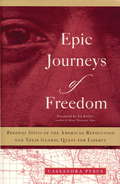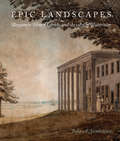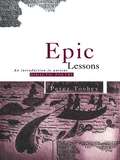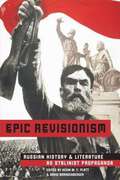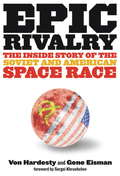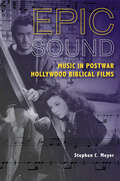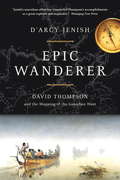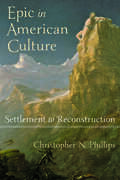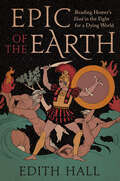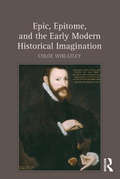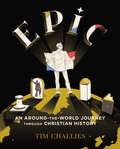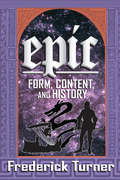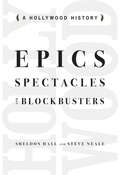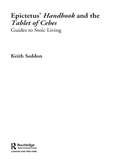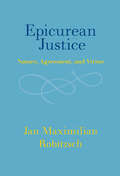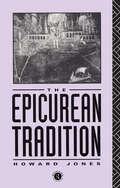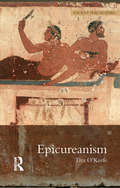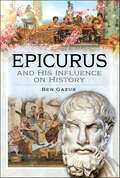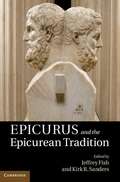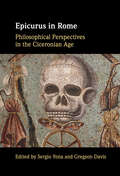- Table View
- List View
Epic Fail: The Ultimate Book of Blunders
by Mark LeighHerewith a handful of sample entries to tickle your funny bones…In the 1824 war between Britain and Ashanti (now part of Ghana), the British Redcoats found themselves surrounded by 10,000 fierce Ashanti warriors, and running very low on ammunition. Their commander ordered Charles Brandon, the army’s stores manager, to break open the reserve ammunition he’d ordered. As the Ashanti advanced Brandon began to open the ammunition boxes – only to find he had brought the wrong supplies. They were all full of biscuits. The grandfather of film star Lana Turner owned a half share in a brand new company that had started bottling a fizzy drink. He thought the drink’s name would affect its saleability and wanted to change it – without success. In frustration and as a protest he sold his 50%. It’s a pity really because Coca-Cola became quite popular…Italian Vittoria Luise was out driving during a fierce storm in Naples. A huge gust of wind blew his car into the River Sele. The car began to sink, but the calm motorist managed to break a window and swim to safety. He dragged himself onto the riverbank – and it was here that he was hit by a falling tree and killed.The Times of 19 October 1986 carried the story of Emilio Tarra, a crewmember of the 1986 America’s Cup race, who was driving from Perth towards Adelaide during the Australian leg of the race. En route, his car sideswiped a kangaroo, leaving it sprawled across the road. Tarra got out of his car and, assuming the kangaroo was dead, decided to take a novelty photograph to show his colleagues. Dressing the kangaroo up in his smart team blazer, he propped it against his car to take its photograph. As he was focusing his camera, the kangaroo, which had only been stunned, woke up and bounded back off into the bush, taking with it the jacket, which contained Tarra’s passport, $2,000 worth of cash and his credit cards.
Epic Journeys of Freedom
by Cassandra PybusCassandra Pybus adds greatly to the work of [previous] scholars by insisting that slaves stand at the center of their own history . . . Her 'biographies' of flight expose the dangers that escape entailed and the courage it took to risk all for freedom. Only by measuring those dangers can the exhilaration of success be comprehended and the unspeakable misery of failure be appreciated.--Ira Berlin, from the ForewordDuring the American Revolution, thousands of slaves fled their masters to find freedom with the British. Epic Journeys of Freedom is the astounding story of these runaways and the lives they made on four continents. Having emancipated themselves, with the rhetoric about the inalienable rights of free men ringing in their ears, these men and women struggled tenaciously to make liberty a reality in their own lives.This alternative narrative of freedom fought for and won is uniquely compelling; historian Cassandra Pybus's groundbreaking research has uncovered individual stories of runaways who left America to forge difficult new lives in far-flung corners of the British Empire. Harry, for example, one of George Washington's slaves, escaped from Mount Vernon in 1776, was evacuated to Nova Scotia in 1783, and eventually relocated to Sierra Leone in West Africa with his wife and three children. Ralph Henry, who ran away from the Virginia firebrand Patrick Henry in 1776, took a similar path to precarious freedom in Sierra Leone, while others, such as John Moseley and John Randall, were evacuated with the British forces to England. Stranded in England without skills or patronage during a period of high unemployment, they were among thousands of newly freed poor blacks who struggled just to survive. While some were relocated to Sierra Leone, others, like Moseley and Randall, found themselves transported to the distant penal colony of Botany Bay, in Australia. Epic Journeys of Freedom, written in the best tradition of history from the bottom up, is a fascinating insight into the meaning of liberty; it will change forever the way we think about the American Revolution.From the Hardcover edition.
Epic Landscapes: Benjamin Henry Latrobe and the Art of Watercolor
by Julia A. SienkewiczWinner of College Art Association’s Wyeth Foundation for American Art Publication Grant Epic Landscapes is the first study devoted to architect Benjamin Henry Latrobe’s substantial artistic oeuvre from 1795, when he set sail from Britain to Virginia, to late 1798, when he relocated to Pennsylvania. Thus, this book offers the only extended consideration of Latrobe’s Virginian watercolors, including a series of complex trompe l’oeil studies and three significant illustrated manuscripts. Though Latrobe’s architecture is well known, his watercolors have received little critical attention. Epic Landscapes rediscovers Latrobe’s watercolors as an ambitious body of work and reconsiders the close relationship between the visual and spatial sensibility of these images and his architectural designs. It also offers a fresh analysis of Latrobe within the context of creative practice in the Atlantic world at the end of the eighteenth century as he explored contemporary ideas concerning the form of art for Republican society and the social impacts of revolution.
Epic Lessons: An Introduction to Ancient Didactic Poetry
by Peter TooheyDidactic Epic was enormously popular in the ancient world. It was used to teach Greeks and Romans technical and scientific subjects, but in verse. Epic Lessons shows how this scientific poetry was intended not just to instruct but also to entertain.Praise for its predecessor, Reading Epic'Toohey's erudition makes the complexities and the strangeness of these ancient poems appear as clear as daylight and his enthusiasm renders them as attractive as the latest blockbuster.' - JACT Review
Epic Revisionism: Russian History and Literature as Stalinist Propaganda
by Kevin M. F. PlattFocusing on a number of historical and literary personalities who were regarded with disdain in the aftermath of the 1917 revolution—figures such as Peter the Great, Ivan the Terrible, Alexander Pushkin, Leo Tolstoy, and Mikhail Lermontov—Epic Revisionism tells the fascinating story of these individuals’ return to canonical status during the darkest days of the Stalin era. An inherently interdisciplinary project, Epic Revisionism features pieces on literary and cultural history, film, opera, and theater. This volume pairs scholarly essays with selections drawn from Stalin-era primary sources—newspaper articles, unpublished archival documents, short stories—to provide students and specialists with the richest possible understanding of this understudied phenomenon in modern Russian history.
Epic Rivalry: Inside the Soviet and American Space Race
by Von HardestyWhen Neil Armstrong and Buzz Aldrin walked on the moon in 1969, they personified an almost unimaginable feat - the incredibly complex task of sending humans safely to another celestial body. This extraordinary odyssey, which grew from the rivalry between the United States and the Soviet Union during the Cold War, was galvanized by the Sputnik launch in 1957. Written by Smithsonian curator Von Hardesty and researcher Gene Eisman, Epic Rivalry tells the story from both the American and the Russian points of view, and shows how each space-faring nation played a vital role in stimulating the work of the other. Scores of rare, unpublished, and powerful photographs recall the urgency and technical creativity of both nations' efforts. The authors recreate in vivid detail the parallel universes of the two space exploration programs, with visionaries Wernher von Braun and Sergei Korolev and political leaders John F. Kennedy and Nikita Khrushchev at the epicenters. The conflict between countries, and the tense drama of their independent progress, unfolds in vivid prose. Approaching its subject from a uniquely balanced perspective, this important new narrative chronicles the epic race to the moon and back as it has never been told before, and captures the interest of casual browsers and science, space, and history enthusiasts alike.
Epic Rivalry: The Inside Story of the Soviet and American Space Race
by Gene Eisman Von HardestyWhen Neil Armstrong and Buzz Aldrin walked on the moon in 1969, they personified an almost unimaginable feat-the incredibly complex task of sending humans safely to another celestial body. This extraordinary odyssey, which grew from the rivalry between the United States and the Soviet Union during the Cold War, was galvanized by the Sputnik launch in 1957. To mark the fiftieth anniversary of Sputnik, National Geographic recaptures this gripping moment in the human experience with a lively and compelling new account. Written by Smithsonian curator Von Hardesty and researcher Gene Eisman, Epic Rivalry tells the story from both the American and the Russian points of view, and shows how each space-faring nation played a vital role in stimulating the work of the other. Scores of rare, unpublished, and powerful photographs recall the urgency and technical creativity of both nations' efforts. The authors recreate in vivid detail the "parallel universes" of the two space exploration programs, with visionaries Wernher von Braun and Sergei Korolev and political leaders John F. Kennedy and Nikita Khrushchev at the epicenters. The conflict between countries, and the tense drama of their independent progress, unfolds in vivid prose. Approaching its subject from a uniquely balanced perspective, this important new narrative chronicles the epic race to the moon and back as it has never been told before-and captures the interest of casual browsers and science, space, and history enthusiasts alike.
Epic Sound: Music In Postwar Hollywood Biblical Films
by Stephen C. MeyerLavish musical soundtracks contributed a special grandeur to the new widescreen, stereophonic sound movie experience of postwar biblical epics such as Samson and Delilah, Ben-Hur, and Quo Vadis. In Epic Sound, Stephen C. Meyer shows how music was utilized for various effects, sometimes serving as a vehicle for narrative plot and at times complicating biblical and cinematic interpretation. In this way, the soundscapes of these films reflected the ideological and aesthetic tensions within the genre, and more generally, within postwar American society. By examining key biblical films, Meyer adeptly engages musicology with film studies to explore cinematic interpretations of the Bible during the 1940s through the 1960s.
Epic Wanderer
by D'Arcy JenishPopular historian D'Arcy Jenish recreates the adventure and sacrifice of mapmaker David Thompson's fascinating life in the wilderness of North America.Epic Wanderer, the first full-length biography of David Thompson, is set in the late eighteenth and early nineteenth centuries against a broad canvas of dramatic rivalries -- between the United States and British North America, between the Hudson's Bay Company and its Montreal-based rival, the North West Co., and between the various First Nations thrown into disarray by the advent of guns, horses and alcohol.Less celebrated than his contemporaries Lewis and Clark, Thompson spent nearly three decades (1784-1812) surveying and mapping over 1.2 million square miles of largely uncharted Indian territory. Travelling across the prairies, over the Rockies and on to the Pacific, Thompson transformed the raw data of his explorations into a map of the Canadian West. Measuring ten feet by seven feet, and laid out with astonishing accuracy, the map became essential to the politicians and diplomats who would decide upon the future of the rich and promising lands of the West. Yet its creator worked without personal glory and died in penniless obscurity.Drawing extensively on David Thompson's personal journals, illustrated with his detailed sketches, intricate notebook pages and the map itself, Epic Wanderer charts the life of a man who risked everything in the name of scientific advancement and exploration.From the Hardcover edition.
Epic in American Culture: Settlement to Reconstruction
by Christopher N. PhillipsThe epic calls to mind the famous works of ancient poets such as Homer, Virgil, and Ovid. These long, narrative poems, defined by valiant characters and heroic deeds, celebrate events of great importance in ancient times. In this thought-provoking study, Christopher N. Phillips shows in often surprising ways how this exalted classical form proved as vital to American culture as it did to the great societies of the ancient world.Through close readings of James Fenimore Cooper, Lydia Sigourney, Henry Wadsworth Longfellow, and Herman Melville, as well as the transcendentalists, Phillips traces the rich history of epic in American literature and art from early colonial times to the late nineteenth century. Phillips shows that far from fading in the modern age, the epic form was continuously remade to frame a core element of American cultural expression. He finds the motive behind this sustained popularity in the historical interrelationship among the malleability of the epic form, the idea of a national culture, and the prestige of authorship—a powerful dynamic that extended well beyond the boundaries of literature.By locating the epic at the center of American literature and culture, Phillips’s imaginative study yields a number of important finds: the early national period was a time of radical experimentation with poetic form; the epic form was crucial to the development of constitutional law and the professionalization of visual arts; engagement with the epic synthesized a wide array of literary and artistic forms in efforts to launch the United States into the arena of world literature; and a number of writers shaped their careers around revising the epic form for their own purposes. Rigorous archival research, careful readings, and long chronologies of genre define this magisterial work, making it an invaluable resource for scholars of American studies, American poetry, and literary history.
Epic of the Earth: Reading Homer's "Iliad" in the Fight for a Dying World
by Edith HallAn urgent study of Homer&’s Iliad, exposing the beginnings of the ecological disaster we now face and facilitating our understanding of its history The roots of today&’s environmental catastrophe run deep into humanity&’s past. Through this unprecedented reading of Homer&’s Iliad, the award-winning classicist Edith Hall examines how this foundational text both documents the environmental practices of the ancient Greeks and betrays an awareness of the dangers posed by the destruction of the natural landscape. Underlying Homer&’s account of brutal military operations, alliances, and cataclysmic struggle is a palpable understanding that the direction in which humanity was headed could create a world that was uninhabitable. Hall provides unparalleled insight into the ancient origins of climate change and argues that the Iliad exposes the deepest contradictions behind the environmental problems we have created. Indeed, it is possible that some of the violence done to the environment throughout history has been authorized, if not exacerbated, by the celebration of the exploitation of nature in Homer&’s poem. Drawing compelling analogies to contemporary poetry, literature, and film, Hall demonstrates that the Iliad, as a priceless document of the mindset of early humans, can help us understand the long history of ecological degradation and inspire activism to rescue our planet from disaster.
Epic, Epitome, and the Early Modern Historical Imagination
by Chloe WheatleyIn early modern England, epitomes-texts promising to pare down, abridge, or sum up the essence of their authoritative sources-provided readers with key historical knowledge without the bulk, expense, or time commitment demanded by greater volumes. Epic poets in turn addressed the habits of reading and thinking that, for better and for worse, were popularized by the publication of predigested works. Analyzing popular texts such as chronicle summaries, abridgements of sacred epic, and abstracts of civil war debate, Chloe Wheatley charts the efflorescence of a lively early modern epitome culture, and demonstrates its impact upon Edmund Spenser's The Faerie Queene, Abraham Cowley's Davideis, and John Milton's Paradise Lost. Clearly and elegantly written, this new study presents fresh insight into how poets adapted an important epic convention-the representation of the hero's confrontation with summaries of past and future-to reflect contemporary trends in early modern history writing.
Epic: An Around-the-World Journey through Christian History
by Tim Challies33 fascinating objects. 1 amazing story. Join author and pastor Tim Challies as he embarks on a three-year journey spanning multiple continents and some of the most unusual places in the world. Tim introduces you to thirty-three carefully selected objects that help you understand the long and complicated history of Christianity in a unique and creative way.Beginning with Jesus and the early church, Challies looks at:The importance of graffiti on an ancient jail cellThe creedal significance of a carving on a museum statueThe enduring importance of ancient manuscripts and booksAnd much more!Along the way, you&’ll discover the story you're already a part of.Epic features:An epic journey: 24 countries, 6 continents, 75 flights, 80 museumsBeautiful full-color book design featuring the objects and Tim's journeyThe complete experience: a 10-episode documentary is also available, taking you on location and providing an immersive experience for understanding the history of Christianity"Together we will listen to these voices of the past tell us the epic story of what God has done and continues to do in our world today." - Tim Challies
Epic: Britain's Heroic Muse 1790-1910
by Herbert F. TuckerThis book is the first to provide a connected history of epic poetry in Britain between the French Revolution and the First World War. Although epic is widely held to have been shouldered aside by the novel, if not invalidated in advance by modernity, in fact the genre was practiced without interruption across the long nineteenth century by nearly every prominent Romantic and Victorian poet. Poets kept the epic alive by revising its conventions to meet an overlapping series of changing realities: insurgent democracy, Napoleonic war, the rise of class consciousness and repeated reform of the franchise, challenges posed by scientific advance to religious belief and cherished notions of the human, the evolution of a postnationalist and eventually imperialist identity for Britain as the world's superpower. Each of these developments called on nineteenth-century epic to do what the genre had always done: affirm the unity of its sponsoring culture through a large utterance that both acknowledged the distinctive flowering of the modern and affirmed its rootedness in tradition. The best writers answered this call, Herbert Tucker argues, by figuring Britain's self-renewal and the genre's as versions of one another. In passing, he notices scores of mediocre congeners (and worse), so as to show where the challenge of a given decade fell and suggest what lay at stake. The background these lesser works provide throws into relief what the book stresses in extended discussions of several dozen major works: an unbroken history of experimentation in which circumspect, inventive, worried epoists engaged because the genre and the age alike demanded it.
Epic: Form, Content, and History
by Frederick TurnerEpic does many things. Among others, it defines the nature of the human storyteller; recalls the creation of the world and of the human race; describes the paradoxical role of the hero as both the Everyman and the radical exception; and establishes the complex quest underlying all human action. Epic illustrates that these ingredients of epic storytelling are universal cultural elements, in existence across multiple remote geographical locations, historical eras, ethnic and linguistic groups, and levels of technological and economic development.Frederick Turner argues that epic, despite being scoffed at and neglected for over sixty years, is the most fundamental and important of all literary forms and thereby deserves serious critical attention. It is the source and originof all other literature, the frame within which any story is possible. The mission of this book is to repair gaps in the literary understanding of epic studies—and offer permission to future epic writers and composers.The cultural genres of Marvel Comics, gothic, anime, manga, multi-user dungeon gaming, and superhero movies reprise all the epic themes and motifs. Consider The Wizard of Oz, Star Wars, The Lord of the Rings, Lost, The Matrix, Superman, Harry Potter, and Narnia. Here can be found the epic beast-man, the miraculous birth of the hero, the creation myth, the founding of the city, the quest journey, the descent into the land of the dead, the monsters, and the trickster. This book will be of interest to all readers fascinated by folklore, oral tradition, religious studies, anthropology, mythology, and enthusiastic about literature in general.
Epics, Spectacles, and Blockbusters: A Hollywood History
by Steve Neale Sheldon HallConsiders the history of the American blockbuster--the large-scale, high-cost film--as it evolved from the 1890s to today.
Epictetus' Handbook and the Tablet of Cebes: Guides to Stoic Living
by Keith SeddonThis new translation presents two works, one by Epictetus and the other by Cebes, two ancient Greek philosophers of the Imperial period, in new translations of clear, straightforward English. In this book, readers will learn how to sustain emotional harmony and a ‘good flow of life’ whatever fortune may hold in store for them. This modern English translation of the complete Handbook is supported by and includes: * the first thorough commentary since that of Simplicius, 1500 years ago* a detailed introduction* extensive glossary* index of key terms* chapter-by-chapter discussion of themes* helpful tables that clarify Stoic ethical doctrines as a glance. Accompanying the Handbook is the Tablet of Cebes, a curious and engaging text. In complete contrast, yet complementing the Handbook’s more conventional philosophical presentation, the Tablet shows progress to philosophical wisdom as a journey through a landscape inhabited by personifications of happiness, fortune, the virtues and vices.
Epicurean Justice: Nature, Agreement, and Virtue
by Jan Maximilian RobitzschThe ancient Greek philosopher Epicurus and his followers advanced a sophisticated theory of justice that occupied a middle position between Plato and Aristotle, on the one hand, and some Sophists, on the other. They held that justice is neither fully natural nor fully conventional, that there is a robust virtue of justice, and that it is always better to be just than to be unjust, but it is not always better to obey the laws. In this book, the first English-language monograph on the topic, Jan Maximilian Robitzsch draws on a range of sources including papyrological evidence to give a comprehensive account of Epicurean justice. He shows how it relates to Epicurean philosophy as a whole and discusses to what extent it can be seen to anticipate modern positions such as contractarianism and legal positivism.
Epicurean Tradition
by Howard JonesFirst published in 1992. Routledge is an imprint of Taylor & Francis, an informa company.
Epicureanism (Ancient Philosophies #7)
by Tim O'KeefeThe Epicurean school of philosophy was one of the dominant philosophies of the Hellenistic period. Founded by Epicurus of Samos (century 341-270 BCE) it was characterized by an empiricist epistemology and a hedonistic ethics. This new introduction to Epicurus offers readers clear exposition of the central tenets of Epicurus' philosophy, with particular stress placed on those features that have enduring philosophical interest and where parallels can be drawn with debates in contemporary analytic philosophy. Part 1 of the book examines the fundamentals of Epicurus' metaphysics, including atoms and the void, emergent and sensible properties, cosmology, mechanistic biology, the nature and functioning of the mind, death, and freedom of action. Part 2 explores Epicurus' epistemology, including his arguments against scepticism and his ideas on sensations, preconceptions and feelings. The final part deals with Epicurus' ethics, exploring his arguments for hedonism, his distinctive conceptions of types of pleasure and desire, his belief in virtue, his notions of justice, friendship and his theology. O'Keefe provides extended exegesis of the arguments supporting Epicurus' positions, indicating their strengths and weaknesses, while showing the connections between the various parts of his philosophy and how Epicureanism hangs together as a whole.
Epicureans and Atheists in France, 1650–1729
by Alan Charles KorsAtheism was the most foundational challenge to early-modern French certainties. Theologians and philosophers labelled such atheism as absurd, confident that neither the fact nor behaviour of nature was explicable without reference to God. The alternative was a categorical naturalism, whose most extreme form was Epicureanism. The dynamics of the Christian learned world, however, which this book explains, allowed the wide dissemination of the Epicurean argument. By the end of the seventeenth century, atheism achieved real voice and life. This book examines the Epicurean inheritance and explains what constituted actual atheistic thinking in early-modern France, distinguishing such categorical unbelief from other challenges to orthodox beliefs. Without understanding the actual context and convergence of the inheritance, scholarship, protocols, and polemical modes of orthodox culture, the early-modern generation and dissemination of atheism are inexplicable. This book brings to life both early-modern French Christian learned culture and the atheists who emerged from its intellectual vitality.
Epicurus and His Influence on History
by Ben GazurHow should we live? In ancient Greece one man came up with a pleasingly simple answer to this question. The philosopher Epicurus taught his followers that pleasure and contentment were the aims of the good life. For hundreds of years Epicureanism was one of the dominant schools of philosophy. But by the 6th century it had all but disappeared. Discovering how and why Epicureanism was driven from philosophy and public discourse reveals much about how Western thought developed. Despite attempts to erase him, the lessons of Epicurus have been recovered from the mists of time and the ashes of Vesuvius. How he was restored to his place in history is a story of brilliant Renaissance scholars, chance discoveries, and a hunger for intellectual freedom. This new biography of Epicurus reveals the life of Epicurus and traces how his teachings have influenced thinkers across time. Epicurus still has much to teach us about friendship, happiness, and our place in the world.
Epicurus and the Epicurean Tradition
by Kirk R. Sanders Jeffrey FishEpicureanism after the generation of its founders has been characterised as dogmatic, uncreative and static. But this volume brings together work from leading classicists and philosophers that demonstrates the persistent interplay in the school between historical and contemporary influences from outside the school and a commitment to the founders' authority. The interplay begins with Epicurus himself, who made arresting claims of intellectual independence, yet also admitted to taking over important ideas from predecessors, and displayed more receptivity than is usually thought to those of his contemporaries. The same principles of autonomy and openness figure importantly in the three major areas of focus in these essays: theology, politics and the emotions.
Epicurus in Rome: Philosophical Perspectives in the Ciceronian Age
by Gregson Davis Sergio YonaThe role of Greek thought in the final days of the Roman republic is a topic that has garnered much attention in recent years. This volume of essays, commissioned specially from a distinguished international group of scholars, explores the role and influence of Greek philosophy, specifically Epicureanism, in the late republic. It focuses primarily (although not exclusively) on the works and views of Cicero, premier politician and Roman philosopher of the day, and Lucretius, foremost among the representatives and supporters of Epicureanism at the time. Throughout the volume, the impact of such disparate reception on the part of these leading authors is explored in a way that illuminates the popularity as well as the controversy attached to the followers of Epicurus in Italy, ranging from ethical and political concerns to the understanding of scientific and celestial phenomena.
Epicurus in Rome: Philosophical Perspectives in the Ciceronian Age
by Gregson Davis Sergio YonaThe role of Greek thought in the final days of the Roman republic is a topic that has garnered much attention in recent years. This volume of essays, commissioned specially from a distinguished international group of scholars, explores the role and influence of Greek philosophy, specifically Epicureanism, in the late republic. It focuses primarily (although not exclusively) on the works and views of Cicero, premier politician and Roman philosopher of the day, and Lucretius, foremost among the representatives and supporters of Epicureanism at the time. Throughout the volume, the impact of such disparate reception on the part of these leading authors is explored in a way that illuminates the popularity as well as the controversy attached to the followers of Epicurus in Italy, ranging from ethical and political concerns to the understanding of scientific and celestial phenomena. This title is also available as Open Access on Cambridge Core.

